8 SPORTS/Student Section
Student section adds 200 seats after backlash

8 SPORTS/Student Section
Student section adds 200 seats after backlash
Stop, drop and Papa Bop: Authentic Korean dishes to fill your stomach and your soul
4 OPINION/Fu
Rice Purity: Hookups were my necessary evil
and NUGW co-chair.
By FIONA ROACH daily senior staffer @fionaroach03Northwestern University Graduate Workers kicked off its union election Tuesday, the first of two days of voting in Evanston and Chicago.
The election, moderated by the National Labor Relations Board, is the product of years of grassroots organizing by graduate workers.
Content warning: This article contains mentions of child sexual assault.
Illinois was set to be the first state to eliminate cash bail at the start of this year, but a December circuit court ruling halted the reform.

The Pretrial Fairness Act would allow defendants to be released as they await trial, rather than having to pay a cash
a member of advocacy group Abolition Coalition of Skokie, said many parent advocates came forward at the meeting to demand concrete, policycentered change.
bond for release — as long as they don’t pose a threat to others or a risk of fleeing.
But the Kankakee County circuit court ruled that the Pretrial Fairness Act violates the powers given to the judiciary by the state’s constitution, preventing the change
from being implemented. State Attorney General Kwame Raoul announced on Dec. 30 that he would appeal the lower court’s decision to stay the act. Without the Pretrial Fairness Act, low-income people accused
If a majority of voters vote “yes,” the NLRB will authorize the United Electrical, Radio and Machine Workers of America as NUGW’s collective bargaining body. All NU graduate workers are eligible to vote. More than 1600 graduate students have publicly pledged to vote yes, according to NUGW.
“We want to have recognition and status as a union of graduate workers, because then there are certain requirements for us to have a seat at the table and have Northwestern bargaining with us in good faith, instead of just picking and choosing when they want to listen to us,” said Emilie Lozier, a fifthyear Ph.D. candidate in chemistry
NUGW’s efforts to unionize center on a five-point platform based on a survey sent out to all graduate students last spring. Lozier said the organization collected about 1900 responses.
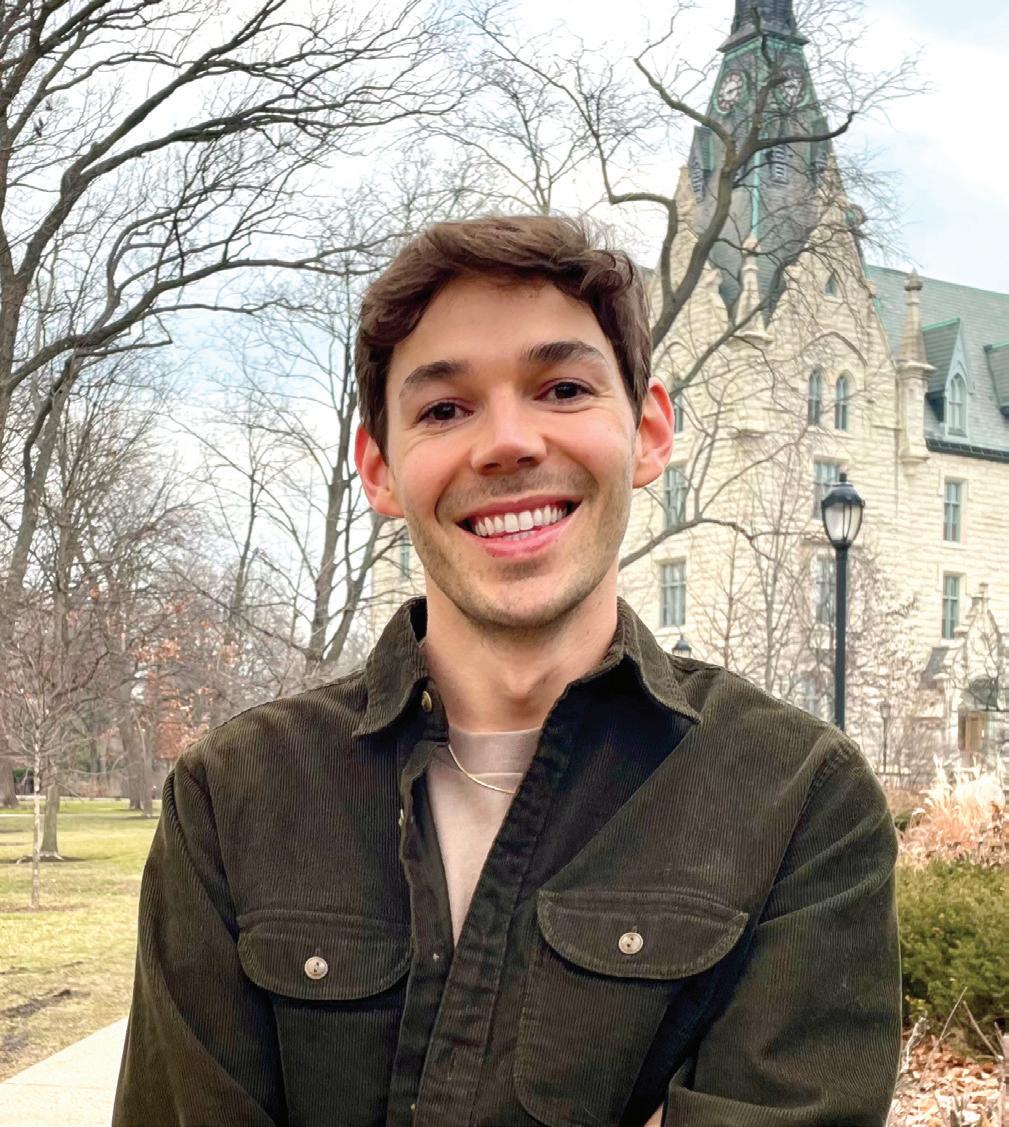
Goals include competitive pay, professional standards in labs and classrooms, power to address misconduct, comprehensive healthcare and financial support for international students.
“Graduate students are not only just students, but also employees performing valuable labor for the universities who employ them,” Lozier said. “We’re all people doing research, not just disembodied brains.”
NUGW chose to pursue a union election after the University refused to voluntarily recognize the organization’s union with UE in November. Lozier said this was not unexpected, as university administrations rarely recognize a union effort without an election.
Lozier and other NUGW members have been negotiating the terms of the election with the University and encouraging students to vote since.
But organizing among graduate workers has been ongoing since before NUGW was founded in 2016.
 By PAVAN ACHARYA daily senior staffer @pavanacharya02
By PAVAN ACHARYA daily senior staffer @pavanacharya02
older students acting as peer advisors to help freshmen and transfers acclimate to campus.
By LILY CAREY daily senior staffer @lilylcareyContent warning: this story contains discussions of racism.
Amid reports of ongoing anti-Black racism at Niles North and Niles West High Schools, several parents urged Niles Township High School District 219 Board of Education members to make systemic change at the Board meeting Tuesday.
For several years, Black and brown students have continuously reported experiences of racism at school. Members of the Niles North and Niles West Black Student Unions spoke at a Dec. 6 board meeting about those experiences, which included use of racial slurs in and out of the classroom and discrimination by security guards.
Angela Sangha-Gadsden,
“What we heard (BSU members) share is that, when they raise their voices against racism, they are disciplined. When they find safety with each other, security is called,” she said. “They are constantly under attack by this multiheaded monster of systemic racism.”
A study by Hanover Research, a third party consultant hired by District 219 to examine racism in its schools, also showed Black students in the district are over-disciplined and that students of many marginalized identities face academic achievement gaps.
Skokie Schools Equity Collaborative organizer Maggie Vandermeer said advocates suggest mandatory hate speech training for staff and students, hiring a second district equity officer, addressing racial discrimination by lunch staff and
Alabama native Josh McKenzie knew no one in the Chicago area when he arrived at Northwestern in July 2010 to take on the position of Assistant Director of Leadership Development.
“I was so nervous stepping into this very first role because it was a place I’d never been to,” McKenzie said. “It was a role that had never existed before and I was going to be tasked with creating a lot of things from scratch.”
Fast forward almost 13 years later, and some students consider McKenzie, now Assistant Dean of Students and Director of Student Transition Experiences, a campus celebrity.
McKenzie, whose last day at NU is Jan. 18, has led Wildcat Welcome since 2020 and has helped plan it since 2010. Wildcat Welcome, the annual student orientation experience, typically occurs during the week leading up to Fall Quarter and features
The 2020 Wildcat Welcome experience was virtual due to the COVID-19 pandemic, which presented challenges for the Student Transition Experiences team and peer advisers, McKenzie said.
McCormick graduate student Jay Zou, who was a peer advisor in 2020 and 2022, said McKenzie was a strong leader throughout the virtual Wildcat Welcome experience.
“Josh was able to emanate positivity across the entire structure of the organization,” Zou said.
He said McKenzie had an ability to make every peer advisor feel special. If you waved, McKenzie waved back, Zou added.
Weinberg freshman Faith Khiet Nhi Do said she appreciated McKenzie’s engagement with students through “Purple Prep” email reminders prior to Wildcat Welcome in 2022.
“I feel like (Wildcat Welcome) would have been less comfortable without him,” Khiet Nhi Do said.
McKenzie helped develop

the Purple Prep checklist to serve as a centralized system for prospective NU students, making for a more organized transition to the University.
said one of the accomplishments he was most proud of during his time with the
More than 1,600 graduate workers pledge to vote yes
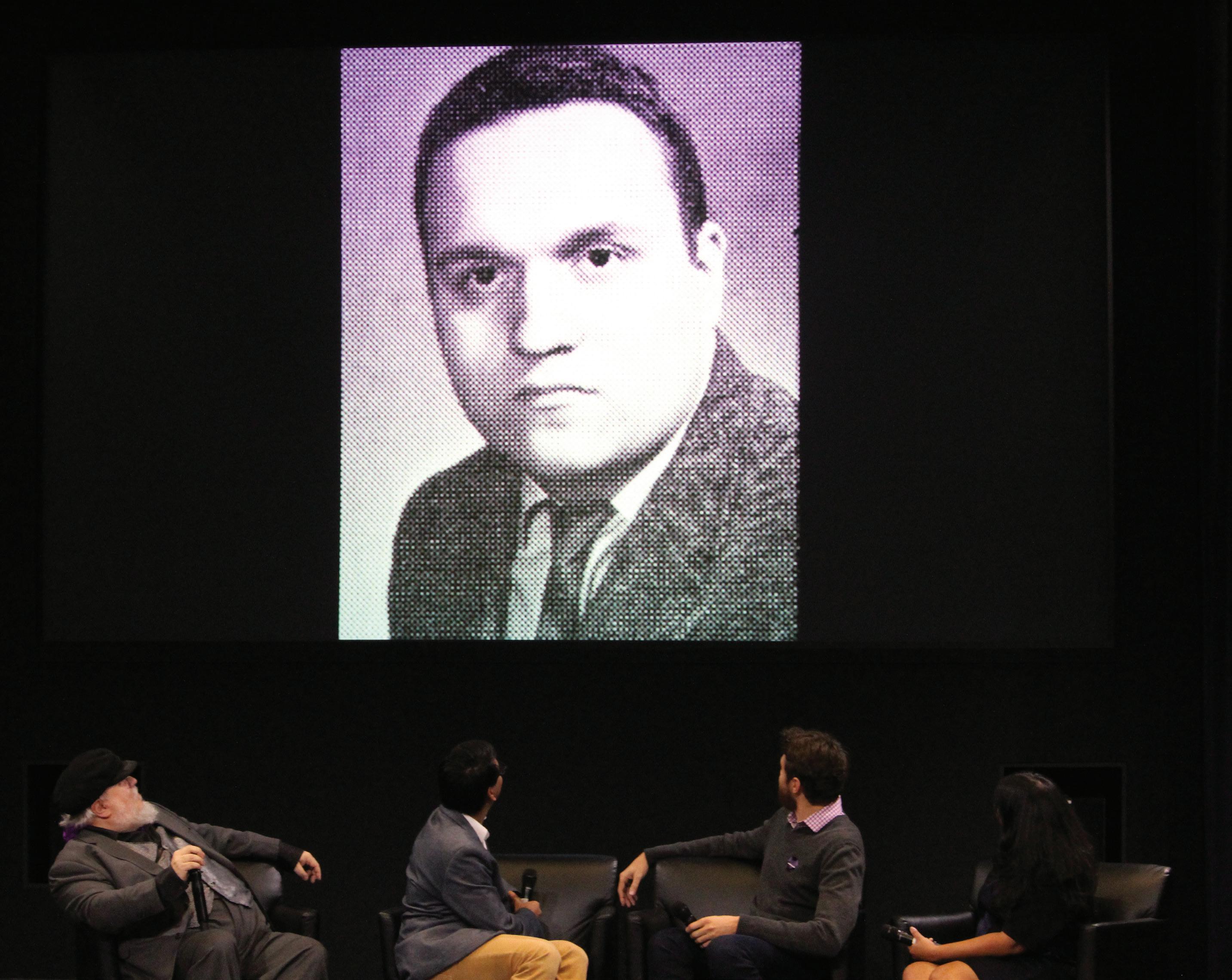
Evanston’s weather relief programs and local centers are ready to help housing insecure Evanston residents. The Daily made a list of the resources and necessities available for this winter.
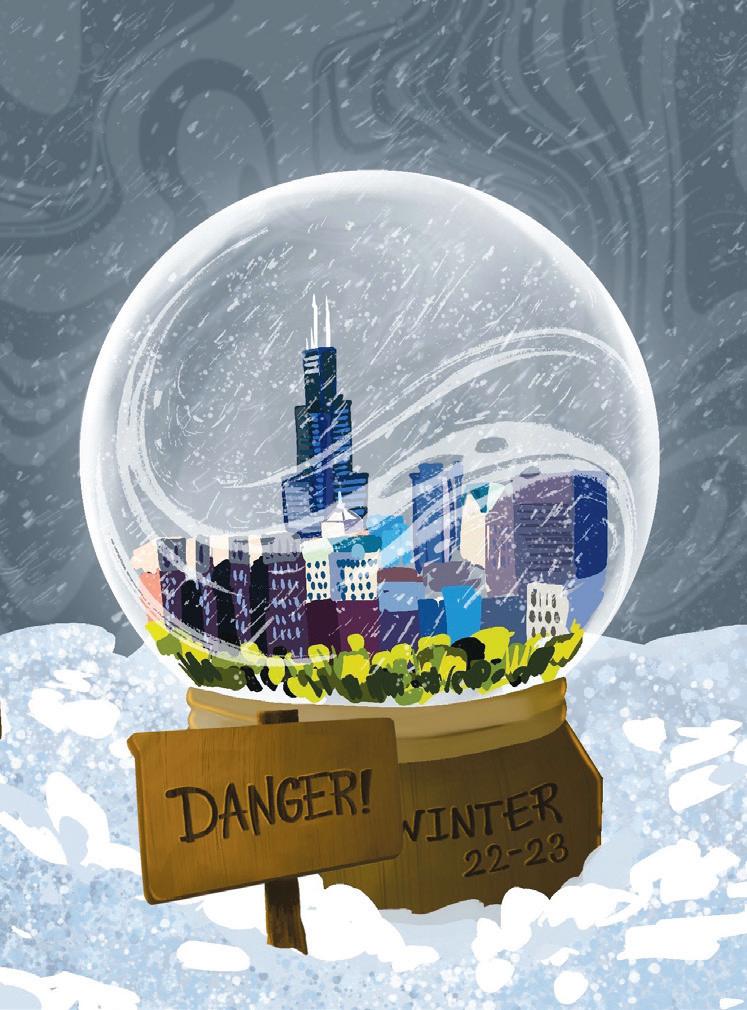
Interfaith Action of Evanston
1509 Ridge Ave. — Monday through Friday, 7 to 11 a.m.
Interfaith Action of Evanston — a community service religious organization — has a hospitality center at St. Mark’s Episcopal Church that’s run by organization staff and volunteers. The center provides breakfast along with services like computer training and job counseling.
“Even if we have 50-degree weather, we’re open,” Executive Director Susan Murphy said.
Interfaith Action also runs a winter warming Overnight Shelter that provides cots and blankets during homeless residents’ stays. The shelter moves to a new faith location every three weeks, Murphy said. The shelter will remain open until the end of May.
1458 Chicago Ave. — Monday through Friday (except Wednesday afternoons), 9 to 11 a.m. and 12 to 2 p.m.
Connections for the Homeless — a social services organization for homelessness prevention, emergency shelter and housing financial assistance — operates the overnight shelter and drop-in center at Hilda’s Place in
conjunction with Interfaith Action. Their main office also provides basic necessities for those with a physical disability or that are housed, including showers, food and clothes.
Like Interfaith Action, Hilda’s Place provides a warming center, open Saturday and Sunday morning with breakfast available.
Murphy said she worked alongside the city to keep the community centers open even during the holiday season, and the city provided homeless residents transportation to the overnight shelter.
“Audrey Thompson with the Parks (and Recreations) Department, worked with me and she was amazing,” Murphy said. “If there’s extreme weather again, or things close again, we’ll work together to make sure that people have a place to go.”
1801 Main St. — Wednesday through Friday, 8:30 a.m. to 9 p.m.; Saturday, 6 a.m. to 5 p.m.
1655 Foster St. — Wednesday and Thursday, 8:30 a.m. to 9 p.m.; Friday, 8:30 to 5 p.m.
The city offers two warming centers located at the Robert Crown Community Center and FleetwoodJourdain Community Center.
4838 N Sheridan Rd. — Monday through Friday, 9 a.m. to 5 p.m.
Sarah’s Circle is an organization aimed at ending homelessness for women. The organization has a Daytime Support Center that serves as a safe space and resource center for basic necessities such as a shower, laundry and food. The center also provides educational
Gov. J.B. Pritzker signed a bill Tuesday banning the sale and distribution of assault weapons in Illinois, effective immediately. Illinois is the ninth state in the U.S. to adopt such a ban.
In his inaugural speech Monday, Pritzker said banning assault weapons was one of his goals for the term. The Senate passed the ban later that night, and the General Assembly passed it Tuesday afternoon 68-41.
In addition to halting the sale of assault weapons in
programming and case management for women finding permanent housing. While it is a Chicago-based organization, its drop-in service is available to Evanston residents.
YWCA Evanston/North Shore
1215 Church St. — Monday through Friday, 8 a.m. to 8 p.m.; Saturday and Sunday, 8 a.m. to 6 p.m.
YWCA Evanston/North Shore is a partner facility with Mary Lou’s Place, providing an emergency shelter
the state, the legislation will limit the number of rounds in purchasable magazines to 10 rounds for long guns and 15 for handguns.
The bill will also prohibit rapid-fire devices because of their ability to turn guns into automatic weapons.
The passage of the bill comes half a year after the Highland Park mass shooting July 4, in which seven died and dozens more were wounded. The shooter used an AR-15 style weapon.
for survivors of domestic violence receive economic stability and resources. The shelter also provides crisis intervention and necessities such as private rooms with clothes, beds and personal supplies. The facility operates through intakes instead of on a drop-in basis, and a 24/7 emergency center hotline is available at 877-718-1868.
“We also offer some work training programs that are available to the shelter members,” staff member Colin Sellers said.
737 Reba Pl. —Monday through Friday, 9 a.m. to 5 p.m.
Reba Place Development Corporation, formerly known as the Evanston Community Development Association, provides affordable housing and mortgage and rental assistance to low-income families. The organization manages three properties — one of which is a 25-unit rental property it owns.
The institution also provides homeless residents their first month’s rent or security deposit through resources from the city and community faith-based groups.
Corporation Executive Director Keith Banks said housing must be made affordable because that is what forces people out on the streets — especially during the “brutally cold” winter months.
“If some vacant or abandoned buildings can be converted into shelters during the winter months, that would be helpful,” Banks said. “Everyone needs a place to lay their head and have a warm, decent, safe place to stay.”
astryrodriguez2025@u.northwestern.edu
“It doesn’t have to be that way,” Pritzker said during a press conference after signing the bill. “This assault weapons ban is a step in the right direction, but there’s no magic fix. We must keep fighting, voting and protesting to ensure future generations only have to read about massacres like Highland Park, Sandy Hook or Uvalde in their history books.”
Several poses will be taken – in your own clothes and with cap and gown. Your choice will be available for purchase. All senior portraits must be taken by Prestige Portraits/Life Touch. $10 sitting fee required.
Illinois bill bans sale of assault weapons, sets limits on ammunitionIllustration by Cate Rose
Aaron Greenberg has always loved storytelling. After receiving a Ph.D. in literature from Northwestern in 2017, Greenberg went on to create robust biographies through his company Biograph, which he founded in 2018 with his brother AJ.
The Biograph app, released in December, is designed for people to tell their stories in real time and preserve memories to share with friends and family. Users can upload photos, text and voice recordings periodically and, unlike social media, the stories are private, which Greenberg says creates the opportunity for vulnerability.

Biograph’s application aims to make authentic storytelling accessible to all. Well-researched biographies can cost upwards of $100,000, an inhibiting factor for individuals who want their story told, according to Greenberg.
The company has worked on both commissioned biographies and pro bono work to elevate the voices of people of color and the Chicago community. An ongoing project called “On the Corner” explores the stories of Chicago residents of many different backgrounds.
“Any life story is not (just) the grand historical events and the profound philosophical meditations but the spontaneous and authentic observations of everyday life,” Greenberg said. “We made this (as a) celebration of the everyday.”
According to former Biograph freelancer Alexander McNab, the company started out telling the stories of the Chicago Jewish community and branched out to sources like Darlena Williams-Burnett, a Black woman who grew up in the South.
McNab said that while people of color have always found ways to tell their stories with dignity, the app will let diverse voices be heard by a larger audience.
Williams-Burnett, who used Biograph to tell her son her life story, was the first in her family to attend college and ended up in public office, elected as the State Central Committeewoman of the 7th Congressional District last March.
“Being a Black person, I come from a legacy of
oral storytellers, which means you don’t have to write (things) down for it to be there,” McNab said. “I think the benefit of (apps) like this and other story telling technologies is that it allows for those voices to be heard by more people.”
Former Biograph advisor Jonathan Eig said he treasures the letters saved from his grandparents and wishes he had more, as Biograph could offer.
Eig called Biograph a powerful mode of storytelling.
“I think we understand the world through stories, we understand ourselves through stories and ultimately, we all want our stories to be remembered,” Eig said. “We want to leave something behind that allows people to remember us.”
Aaron Greenberg said anecdotally, the users have been diverse in terms of age, gender and race, which he attributes to the elimination of the price barrier.
NU Ph.D. candidate in Art History Alissa Schapiro described Biograph as social media with a heart and soul.
One of the first to test a beta version of the app, Schapiro appreciated how she could preserve an intimate dinner on a card, an additional paid service the app offers. The card, which came with a photo and audio transcription, has since become a treasured keepsake.
“The three of us memorialized a moment of
friendship in a way that felt collaborative and honest,” Schapiro said.
Poet, author and English professor at Beloit College Toby Altman, a graduate classmate of Greenberg, said Biograph democratizes writing and gives writing tools to people who might not have had access otherwise.
Co-founder AJ Greenberg said they already received feedback from people who are glad they saved memories, ranging from the excitement of a night out to hearing the voice of a loved one they have lost.
The app seeks to preserve human connection, Greenberg said. Schapiro said that this type of connection can help bring people together.
Schapiro added that stories help us understand each other and to share our own narratives. When society is fractured, she said, stories have the power to break down boundaries of experience, time and space.
Greenberg said the app tries to find a better way for people to create and access their own memories.
“The goal (of the app) is to reinvent the way that people record their memories and create memories,” AJ Greenberg said. “And connect in a much more meaningful way with themselves and with their friends and their families.”
jonathanaustin2023@u.northwestern.edu
The Daily Northwestern www.dailynorthwestern.com
Editor in Chief Alex Perry eic@dailynorthwestern.com
General Manager Stacia Campbell stacia@dailynorthwestern.com
Holly and John Madigan Newsroom
Phone | 847.491.3222
Campus desk campus@dailynorthwestern.com City desk city@dailynorthwestern.com Sports desk sports@dailynorthwestern.com Ad Office | 847.491.7206 spc-compshop@northwestern.edu
The Daily NorThwes TerN is published Monday and Thursday during the academic year, except vacation periods and two weeks preceding them and once during August, by Students Publishing Co., Inc. of Northwestern University, 1999 Campus Drive, Evanston, IL 60208; 847-491-7206.
First copy of The Daily is free, additional copies are 50 cents. All material published herein, except advertising or where indicated otherwise, is Copyright 2022 The Daily NorThwesTerN and protected under the “work made for hire” and “periodical publication” clauses of copyright law.
POSTMASTER: Send address changes to The Daily NorThwesTerN, 1999 Campus Drive, Evanston, IL 60208. Subscriptions are $100 for the academic year. The Daily NorThwesTerN is not responsible for more than one incorrect ad insertion. All display ad corrections must be received by 3 p.m. one day prior to when the ad is run.
Join the online conversation at www.dailynorthwestern.com
This is “Rice Purity,” a column covering all things gaysian America, sex and scandal.
This is an ode to sucking dick … Among other things, of course.
I had known I was gay for a while — in the fifth grade I once searched “how to watch porn without the girl.” Perhaps we all knew.
I came out to a few friends and to my younger sister in my junior year of high school, and I started seeing my first guy when I was 18. We smoked weed and messed around. It meant absolutely nothing, thus it was absolutely perfect.
I always thought college would be my big gay-palooza. For some reason, I thought my Cinderella moment would come as soon as I escaped my parents’ home and set foot in Evanston. I would march through that arch, and suddenly, tendrils of queer magic would embrace me. I thought I would be showered by iridescent dust as my hoodie and skinny jeans miraculously unfurled into the ballgowns I’d dreamt of. I would finally find my fairy godmother, I would finally get my pumpkin carriage. Dear God, I wanted a pumpkin carriage.
That didn’t happen.
The pandemic knocked the wind out of my
gay plans. COVID-19 shut everything down during my freshman year of college and leaving my dorm felt like risking my life. There were no bars to go out to, no people to meet, no fabulous, wild queer things to do. I mainly just sat.
Things changed by my sophomore year, and COVID-19 restrictions loosened. People could actually … hang out. As my friends started in-person classes on campus, I was hundreds of miles away in the nation’s capital, covering Congress for 10 weeks at Northwestern’s Medill on the Hill program. I was alone. In a big city. And I went feral.
I was f--king, I felt good. I felt powerful. Men would shower me with compliments. What more did I need?
I had always felt being gay was a curse. I felt like my queerness ruined my ability to make friends with the other boys in class, like my queerness ruined my parents’ ability to be proud of me, a secret blemish on a Chinese family’s American dream.
And after about a year of leaning into every whorish impulse and doing just about anything under the sun, I realized it was time for me to sit down and face the music. Because while I loved myself when I was someone else’s f--ktoy, I hated myself the rest of the time.
In Washington, D.C., Grindr became my crutch. I felt wholly lost and inadequate in the halls of Capitol Hill with hordes of journalists much older and less melanated than me. Impostor syndrome torpedoed any sense of confidence I had left.
- YIMING FU, Assistant Opinion EditorBut the men in D.C. loved me. And in a way, they were the first people who embraced me for everything I was. They knew I was gay, they knew I was Asian and they wanted me more because of it. It was a novel feeling. At the time, I wasn’t even capable of feeling that way about myself.
of the time.
Now in my junior year, I’m finally building a life that nourishes me. I’m eternally grateful for my friends who eat dinners with me, dance with me, sing bad karaoke with me and love me for every little bit of who I am. I’m grateful for my therapist, too, who candidly points out my constant self-sabotage.
I will always love casual sex. It’s helped me become fearsome, confident and feel good in my own skin. It’s helped me communicate what I like, and it’s helped me walk away from things I don’t. I haven’t sworn off casual sex, and I don’t plan to. But I know now it can’t be the only thing that makes me feel good.
I’m most proud of how I have finally begun investing in myself. I dedicate my energy to building lifelong memories with my friends, taking spontaneous trips and eating good food. I slowly erode the negative self-talk I once used to protect myself but now no longer serves me. I remind myself every single day of how beautiful I am inside and out and give myself the compliments I relied on anonymous men for.
I know now I deserve all the love in the world. And I might just be the perfect person to give myself that.
But, in bathhouses, parks, stairwells and random apartments, I could be anyone other than the floundering 19-year-old I was. When
However, men come and go. And after about a year of leaning into every whorish impulse and doing just about anything under the sun, I realized it was time for me to sit down and face the music. Because while I loved myself when I was someone else’s f--ktoy, I hated myself the rest
Yiming Fu is a Medill junior. He can be contacted at yimingfu2024@u.northwestern.edu. If you would like to respond publicly to this op-ed, send a Letter to the Editor to opinion@dailynorthwestern.com. The views expressed in this piece do not necessarily reflect the views of all staff members of The Daily Northwestern.
It was one of those magical moments, one when a writer feels the urge to pull out their notebook and jot down notes.
I was watching the Arts Alliance production of “In the Heights,” specifically the “Carnaval del Barrio” scene displaying performers’ flags. I remember seeing the shadow blue globe in the Brazilian flag, the white star among the royal blue triangle in the Puerto Rican flag, the red-blue-orange combo in the Armenian flag and many more.
As a man with two very different flags in my veins, Hungarian and Puerto Rican, I love seeing people proud of who they are. It inspires me.
The flags reminded me of the beauty of Latinidad at Northwestern. As a fifth-year undergraduate student at NU, I have seen firsthand the transformation of Latinidad on campus. I saw the nascent Latine community I knew as a freshman and its rapid decline with virtual learning. I saw the years following, when we all struggled to host events over Zoom and balance our responsibilities to other people with our responsibility to ourselves.
Our community’s great leaders, organizations and cadre still write the story of this year. I am honored to be a small cog in our great machine. This story is only my own — a small part of the canon, not its entirety. It is impossible for one story to capture the entire Northwestern Latine experience.
The great exodus of NU students in March 2020 was a terrifying time. This was challenging for community-based student groups, which desperately tried to hold onto their programming. Most students had no idea what to do or expect during 2020, and as soon as we got a handle on one COVID-19 reality, there was new advice and a new variant to adapt to. Focusing on what you can do for your club was understandably a secondary concern.
The 2020-21 academic year was even sadder than the previous spring and summer. In my eyes, the groups who kept our culture going were the Dale Duro Latín Dance Company, the Society of Hispanic Professional Engineers and the Multicultural Greek Council, specifically Omega Delta Phi, Kappa Delta Chi, Sigma Lambda Gamma, Lambda Theta Alpha, and La Unidad
Our community’s great leaders, organizations and cadre still write the story of this year. I am honored to be a small cog in our great machine. This story is only my own — a small part of the canon, not its entirety.
-STERLING KOSSUTH ORTIZ, Columnist
Latina Lambda Upsilon Lambda. Dale Duro worked its tail off to have a virtual spring dance show, practicing over Zoom to create a streamed performance. The SHPE created a thriving community of Latine engineers. MGC threw everything at the wall regarding events and recruitment to survive during this period of great adversity. All five Latine-founded multicultural chapters had the dog in them and never gave up.
I name all these groups so people in the present and future can understand the sacrifices our student leaders made to keep Latine culture alive at NU. As a brother of Omega Delta Phi and former President of the Multicultural Greek Council, I can attest to the collective work of these organizations, crawling on our bellies to create engaging virtual events and fill the long, lonely hours during harsh restrictions.
Thomas Paine wrote, “the harder the conflict, the more glorious the triumph,” and he was right — there has been no glory greater than seeing what nine months of hell produced.
To say it was one person or group that kept working during the nadir of the pandemic would be a lie. These groups preserved the bricks of culture that make up the foundation for everything Latinidad that exists today at NU.
The 2021-22 academic year also brought with it the revival of three cornerstone Latine groups: Alianza, Ballet Folklórico and Mariachi NU. All three groups were foundations of Latinidad at NU before the pandemic.
With new and emboldened leaders, these groups came back in Sept. 2021 and found strong interest from Latine students. Alianza started to plan for general events, while Ballet Folklórico and Mariachi planned performances.
The apex of last year’s rebirth came during spring 2022. Dale Duro, Ballet Folklórico and Mariachi all prepared for their first in-person shows since 2019, and Alianza was preparing to host Festival LatiNU, which turned out to be a standing-room only event, crushing expected turnout. The SHPE was consistent, with its former president of two years handing the reins to new leadership who deigned to keep the success rolling.
Speaking from the Latine Greek point of view in that quarter, this quarter was the cap to a very strong year. My fraternity Omega Delta Phi added two new members in spring, marking six new members that academic year, and breaking into double-digit membership for the first time since the early 2010s. Kappa Delta Chi continued its membership renaissance by initiating four new members that quarter and initiating a total of nine new members that year.
Spring 2022 was a beautiful time to be Latine.
Latines at NU paint the grand tapestry with our own stories every day. So far, we’ve continued to succeed. Our student organizations are thriving; we have both new members in old clubs and new clubs in general.
It is upon this work that NU Latinidad stands today, 34 months after the end of the world as we once knew it.
Sterling Ortiz is a SESP fifth year. You can contact him at sterlingortiz2022@u.northwestern.edu. If you would like to respond publicly to this op-ed, send a Letter to the Editor to opinion@dailynorthwestern.com. The views expressed in this piece do not necessarily reflect the views of all staff members of The Daily Northwestern.
LETTERS TO THE EDITOR may be sent to 1999 Campus Drive, Evanston, IL 60208, via fax at 847-491-9905, via e-mail to opinion@dailynorthwestern.com or by dropping a letter in the box outside The Daily office.
Letters have the following requirements:
• Should be typed
• Should be double-spaced
• Should include the author’s name, signature, school, class and phone number.
• Should be fewer than 300 words
They will be checked for authenticity and may be edited for length, clarity, style and grammar.
Letters, columns and cartoons contain the opinion of the authors, not Students Publishing Co. Inc. Submissions signed by more than three people must include at least one and no more than three names designated to represent the group.
Editorials reflect the majority opinion of The Daily’s student editorial board and not the opinions of either Northwestern University or Students Publishing Co. Inc.
 By KIMBERLY ESPINOSA the daily northwestern @nedaziakim
By KIMBERLY ESPINOSA the daily northwestern @nedaziakim


After Evanston banned housing discrimination based on most criminal records, advocate Gail Schechter didn’t see much coverage that she felt accurately represented the issue.
“It’s all this sort of loaded language that doesn’t really explain what really happened,” Schechter, the executive director of Chicago-based Housing Opportunities & Maintenance for the Elderly, said.
Last October, City Council amended the Fair Housing Ordinance to prohibit most housing discrimination based on criminal history and housing discrimination based on the actual or perceived status as a victim of domestic violence.

It does not apply to housing applicants convicted of crimes within the past three years or those convicted of child sex offenses who are currently under residency restrictions.

The amendment also requires landlords to complete a prequalification stage that can include screening for income, rental history and credit score before accepting or rejecting an applicant. Afterward, landlords can optionally complete a criminal history background check.
Schechter said the amendment was a necessary change.
“It’s talking about people who have arrest records a day past three years ago for offenses that have nothing to do with how good you would be as a tenant,” she said. “Recognizing that people have paid their dues at this point.”

Nevertheless, she said the attention the ordinance received shows problems with the way people tend to discuss those with criminal records, reflecting issues that linger even after reforms are complete.
Advocates also expressed worry over whether the reforms would be followed through with.
Javier Ruiz, an eviction prevention organizer at the Metropolitan Tenants Organization, said he was concerned about the amended ordinance’s housing applicant screening process.
“It’s kind of hard to pin down when someone violates the Fair Housing Ordinance because obviously, they’re not being overtly discriminatory, but they’ll do it in a sneaky way,” Ruiz said.
Sometimes landlords will not allow families with more than a few kids, pose application fees or charge families different application fees, he said.
For those facing hidden discrimination, advocacy groups like Evanston-based Open Communities are available to address violations of laws like the Fair Housing Ordinance.
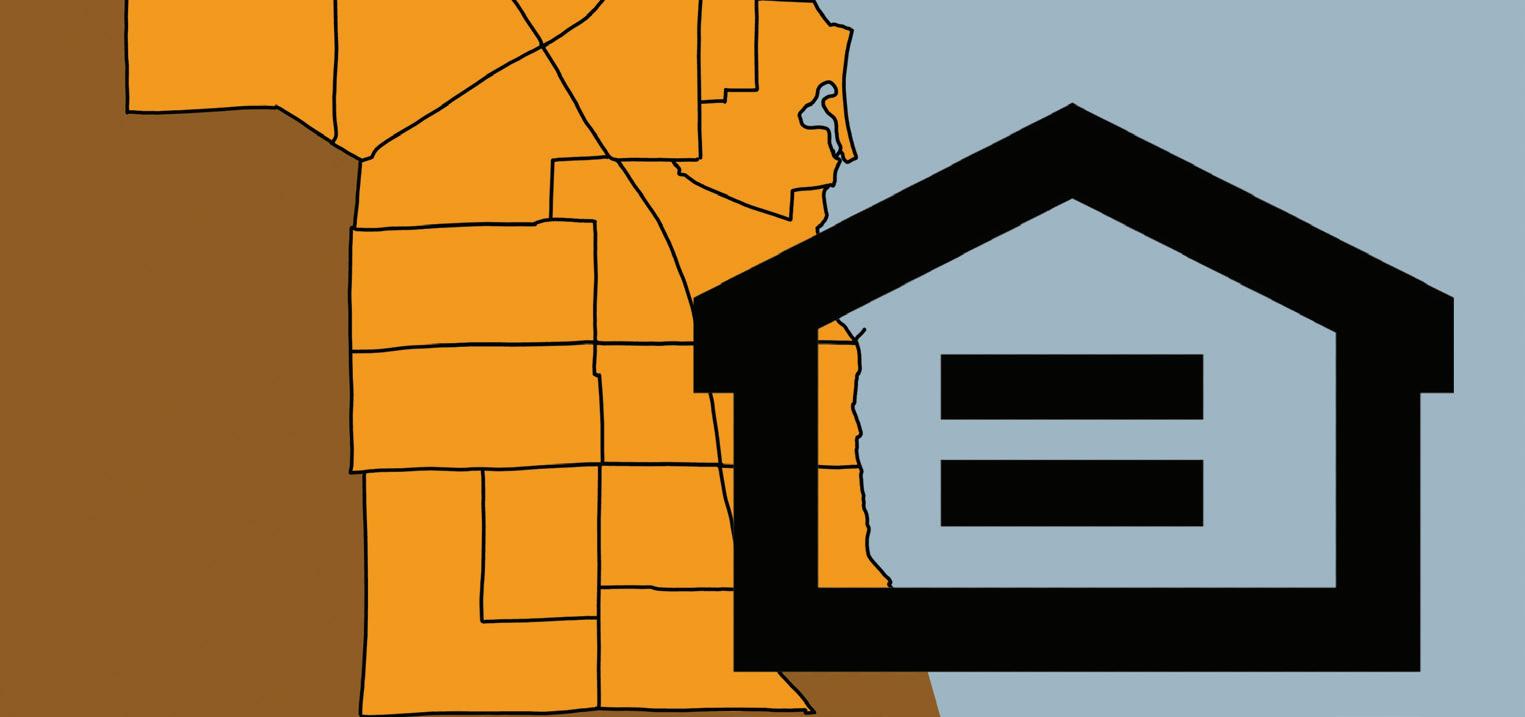



Dominic Voz, the assistant director of Fair Housing at Open Communities, said the group can offer legal counseling services to those facing housingrelated challenges.
They also help people decide on next steps, from helping to educate landlords or working with fair housing attorneys to file a legal claim.
“Open Communities is definitely ready to


support community members who are facing housing discrimination in ways that the ordinance spells out,” Voz said. “We can help folks look into their situation and whether the law was in fact broken, and help counsel people to decide what are the next steps they want to take.”

kimberlyespinosa2026@u.northwestern.edu

Kj Chang opened up Papa Bop in September to bring authentic Korean food to downtown Evanston.
“I can taste our dishes in Korea too. They aren’t a fusion style,” Chang said. “How we eat in our house and how Korean people eat in Korea is how we cook.”
So far, Chang said the most popular menu item has been “bibimbop” — spelled “bop” like Papa Bop instead of bibimbap. It’s a rice dish served with assorted vegetables and an over-easy egg on a traditional Korean hot stone with a bowl of soup. After working in the restaurant industry for 22
years, Chang was ready to take charge. He opened the restaurant with a menu that includes hibachi entrees, ramen options and a handcrafted lemonlime drink, which according to Papa Bop’s motto “will fill your stomach and your soul.”
Papa Bop, like other restaurants across the country, is navigating rising prices of meat and oil due to inflation. However, Chang believes he can limit the effects of inflation through menu prices. Most dishes range between $11 and $18.
When deciding where to start his business, Chang picked a location near the Chicago Avenue Trader Joe’s, a place he thought was sure to attract college students. But so far, he’s seen a clientele he estimates is 99.5% neighbors and only 0.5% students.
Nevertheless, Chang said customers have
given positive reviews, giving him hope that serving a different clientele will allow him to be just as successful.
Lena Kim, owner of crafty gift store niceLena & Friends, tried Papa Bop when it opened and loved it, she said. She added she just took her family back so they could all try it together. Not only is the food great, Kim said, but the Chang family is very friendly and cares about its customers.
Kim said the only thing missing during her first visit was a soup option on the menu. But after she brought it up to Chang, he added two soups.
“I’m also Korean, and we are from the land of soup, so it’s really important,” Kim said. “I’m hoping he adds more now that it’s winter, but I just really wanted to see soup represented.”
Because Papa Bop is a family-owned, neighborhood

restaurant, Kim said she thinks Evanston residents will be more inclined to eat there.
In fact, some students have overlooked the distance and ventured over a mile from Northwestern to the establishment.

Weinberg sophomore Mahdi Haseeb said he was excited another Korean option was coming to town, since there aren’t many near campus.
Aside from the cozy atmosphere, Haseeb said the house-made drinks and simplicity of the menu set Papa Bop apart.
“Initially, I thought everything was a bit pricey,” Haseeb said. “But the generous portion sizes, authenticity of the food and welcoming environment made it a great experience.”
ellajeffries2025@u.northwestern.edu
From page 1
of low-level crimes will continue to suffer in custody while wealthy people can be free, said Darlene Cannon, a member of Citizens Network of Protection and 2nd Ward aldermanic candidate.
“It’s a matter of the haves and the have-nots,” Cannon said. “The people who are being forced to stay in jail are Black and brown people.”
For now, individual counties can decide whether they follow the Pretrial Fairness Act, Prtizker Prof. Juliet Sorensen said. According to WTTW, Chicago’s local PBS affiliate, 65 of Illinois’ 102 counties chose to keep cash bail.
The judge’s ruling also determined the Illinois legislature should have put the measure up for a referendum vote. The State Supreme Court’s timing should not be seen as an indicator of whether it will uphold or overturn the law, Sorensen added.
“The (Illinois) Supreme Court is merely delaying the implementation of a law while it does what it’s entitled to do, which is review its constitutionality,” she said.
Many conservative politicians have criticized the law as making Illinois unsafe. But Sorensen said New Jersey, which has dramatically reduced its practice of cash bail, saw the opposite effect.
Cannon said she has seen many ads arguing the elimination of cash bail will free “murderers and rapists,” a claim she called misleading. Under the act, a defendant does not qualify for pretrial release if there is a determined risk of fleeing or threat to others, such as in stalking or sexual abuse cases.
“This is about smaller, non-threatening crimes,” Cannon said.
As the court considers the case, the Illinois legislature passed a bipartisan bill Tuesday abolishing life imprisonment without possibility of parole for people ages 20 and younger. The bill excludes anyone convicted of predatory criminal sexual assault of a child.
This marks a significant change for the state: Illinois abolished parole in 1978, so prisoners eligible for parole either were sentenced before 1978 or qualify for youthful parole.
“Illinois is one of the few states in the country that there are virtually no ways out (of prison),” said Alissa Rivera, communications director for Restore Justice, a group working toward ending mandatory minimum sentences.

Sentencing a child to die in prison with no parole review is a violation of the United Nation Convention on the Rights of the Child, she said.
But if cash bail is abolished, advocates for the Pretrial Fairness Act said fewer families would suffer. Cannon said she met a man in Springfield whose family became unhoused after he was arrested and put in jail for missing his court date due to an unpaid parking ticket.
“(The act) is moving the needle in the right direction,” Cannon said.
kristenaxtman2025@u.northwestern.edu
From page 1
“I get emotional when I think about the six years of work and all the folks who have gone out into the world to do amazing things (and) who spent so much of their time at Northwestern making sure this exact moment could happen,” said Sara Bowden, a fourth-year Ph.D. candidate in music theory and cognition and NUGW co-chair. “Every step of this process has been so affirming and validating that we need this union.”
Polling locations for the election include
From page 1
security, and creating a plan to hire and retain Black staff.

However, collective efforts have repeatedly “been met with resistance, defensiveness and denial” by the school board, Vandermeer said.
Since both groups’ foundings in 2020, the main goal of Abolition Coalition and Skokie Schools Equity Collaborative has been to support efforts spearheaded by Black and brown students, parents emphasized.
Many parents attended Tuesday’s meeting in hopes of alleviating pressure for Black Student Union members, said District 219 parent and Abolition Coalition member Jasmine Sebaggala.
“You already have to go to school and deal with so many issues, but it shouldn’t be so hard to just be a student,” Sebaggala said.
Dealing with racism in the district as a parent, though, is uniquely challenging, said Abolition Coalition member Monique Cooley-Hicks. She said balancing her advocacy with working and
From page 1
Student Transition Experiences Office was his team’s ability to connect with students.

“It doesn’t feel like it is a robot that is helping to move them through Wildcat Welcome or orientation, but a group of people that truly care for them in their experience,” he said.
Assistant Director of Student Enrichment Services Mayra Garces said the current version of Wildcat Welcome has McKenzie’s “fingerprints all over it.”
Garces, who was Assistant Director of New Student and Family Programs from 2015 to 2019 and helped plan Wildcat Welcome in 2020, also said McKenzie helped her learn about being a professional in higher education and allowed her to try new initiatives in the office.
Early in Garces’ time working on Wildcat Welcome, McKenzie allowed her to modify the peer advisor training program for Wildcat


Mudd Science and Engineering Library and Parkes Hall in Evanston, and Robert H. Lurie Medical Research Center in Chicago.
“We, the graduate workers of NUGW-UE, are thrilled that as a culmination of over eight years of relentless grassroots organizing we have finally created the opportunity for ourselves to take collective power in our workplace by voting UNION YES in the election,” NUGW said in a December email to The Daily.
NUGW will gain an official mechanism to bargain with the University if the unionization is authorized. The organization’s next steps would focus on negotiating a contract, Lozier
supporting her children has been difficult to cope with over the past several years.
“You’ve got to push them through … despite all of those challenges, and then try to make it so that they can remember something fun about the four years,” said Cooley-Hicks, the parent of a District 219 alum. “It was very difficult. I’m very proud of myself, and my daughter is onto the next level, but it took a lot.”
Later in the meeting, a Hanover representative presented an overview of their report findings.
The equity data analysis findings, based on data collected during the 2020-21 school year, showed that Black, Hispanic, economically disadvantaged, limited English proficiency and special education students are less likely to achieve a grade point average of 3.0 or higher.
The findings also showed the district disciplined and suspended Black students at higher rates than any other racial group.
School board members acknowledged these findings are “nothing new” and said they intend to follow through with several policy recommendations proposed by Hanover.
Welcome by increasing the number of training dates, she said.
“He was such an encourager and a true champion of the changes that I wanted to implement,” Garces said.
She added that McKenzie’s impact on the Student Transition Experiences Office was part of a “real care” for new students.
Assistant Vice President of Wellness and Dean of Students Mona Dugo wrote in an email to The Daily that one of McKenzie’s greatest skills is his ability to understand students’ needs. She said under McKenzie, his team has been able to consistently “meet the moment” for students.
“His warm smile and sharp wit have been a constant for our entering students for 12 and a half years,” Dugo wrote. “I will miss him dearly and know that he will be incredibly successful in his next endeavors.”
McKenzie did not disclose his next position in Austin, Texas, but said he will work outside
said, similar to Northwestern University Library Workers following its union authorization.
NULW voted to unionize in December 2021 and is currently negotiating a contract with the University. Lozier said NUGW is looking forward to organizing a bargaining committee and would then send another survey to gauge graduate workers’ priorities.
“We hope the message is clear that this isn’t just some little band of rabble-rousing, this is the strong majority of your workforce saying that they want a say,” Lozier said.
fionaroach2025@u.northwestern.edu
These include further investigating opportunity gaps, training teachers on how to accommodate different learning styles and providing more academic support in younger grades to keep everyone on track for grade-level learning goals.
Parents said the Board has the power to mandate these policies, but that it has not yet implemented parent advocates’ suggested policy changes despite calls for action dating back to 2020.
Many parents remain anxious about their childrens’ futures in the district. Sangha-Gadsden and Roxann Salgado, another member of Abolition Coalition, both have children who attend feeder schools to Niles North and Niles West High Schools. They said they want to see the district take concrete steps forward.
“It is concerning, because our kids are going to come here soon,” Salgado said. “We also grew up with racism in our school systems. It’s (2023), and we just want to see change. We belong to this community, and we want to feel like we belong in this community.”
lilycarey2025@u.northwestern.edu
of higher education and is looking forward to living closer to family.
He also said he now has to — ironically — support himself in the transition to the next part of his life.
“This really has been a unicorn of an experience that I know I will not be able to replicate anywhere else,” McKenzie said.
pavanacharya2025@u.northwestern.edu
An article published in Monday’s paper titled “‘The Waario’ brings oohs and waahs to Fisk Hall” misspelled Nick Hollenbeck’s last name. The Daily regrets the error.

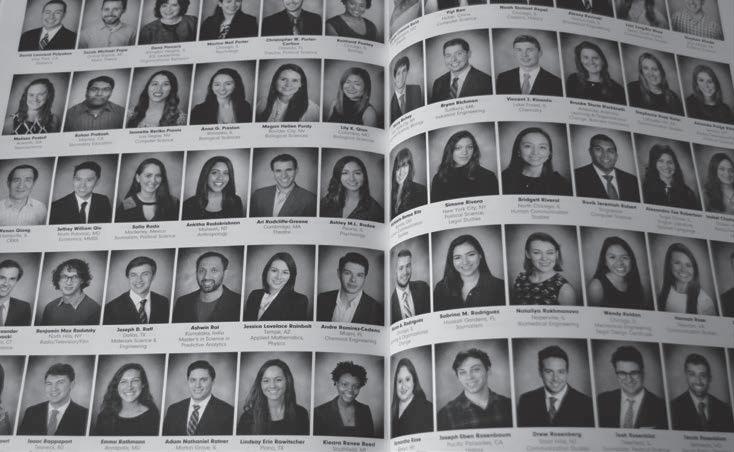
THE DAILY NORTHWESTERN is not responsible for more than one incorrect insertion of an ad. Corrections must be received by 10am on the day before ad runs again, call 847-4917206. All Classifieds must be paid in advance and are not accepted over the phone. To run online, ad must run in print on same day. The Daily does not knowingly accept misleading or false ads and does not guarantee any ad or claim, or endorse any advertised product or service. Please use caution when answering ads, especially when sending money.
It is the policy of The Daily Northwestern to accept housing advertising only from those whose housing is available without discrimination with respect to sexual orientation, race, creed or national origin. The presumption is therefore, that any housing listing appearing here is non-discriminatory.
THE DAILY NORTHWESTERN is not responsible for more than one incorrect insertion of an ad. Corrections must be received by 10am on the day before ad runs again, call 847-4917206. All Classifieds must be paid in advance and are not accepted over the phone. To run online, ad must run in print on same day. The Daily does not knowingly accept misleading or false ads and does not guarantee any ad or claim, or endorse any advertised product or service. Please use caution when answering ads, especially when sending money.
HELP WANTED ADS are accepted only from advertisers who are equal opportunity employers. The presumption, therefore, is that all positions offered here are available to qualified persons without discrimination on the basis of race, color, religion, national origin, sex, sexual orientation, marital status, age, handicap, or veteran status.
Google’s Clinical Director of Consumer and Mental Health Megan Jones Bell spoke on the technology company’s mental health initiatives as a part of the Center for Behavioral Intervention Technologies’ digital mental health series.

“We believe that there are unique ways that Google can support people at every stage of their journey,” Jones Bell said.
The series hosts events each month during the academic year and aims to cover topics like clinical research, human computer interaction and healthcare.
The series has run since 2020.
“(Jones Bell) really was one of the first psychologists, I think, who made her career in industry,” Center for Behavioral Intervention Technologies Director David Mohr said. “She has a remarkable breadth of expertise in clinical science and design and an industry leadership.”
Jones Bell used Google search and information
data to demonstrate that the mental health crisis is worsening. She said working with mental health does not refer to just disorders, but also well-being.
While there is a shortage of mental healthcare providers, there are also problems with quality, Jones Bell said. She added that many providers do not use “evidence-based treatments” and that the cost of healthcare in the U.S. makes these services inaccessible.
“There’s a lot of room for improvement that we need to make as a field in terms of more compassionate, humane care … especially at the more severe end of the care spectrum,” Jones Bell said. “We know that these are enormous problems — they’re complex, they’re interconnected. A single point of intervention is not going to be sufficient.”
Jones Bell mentioned that YouTube partnered with National Alliance on Mental Illness to create selections of videos that highlight clinically approved informative content about mental disorders and personal stories.
Shel also discussed the multitask unified model, an artificial intelligence system designed to more accurately suggest mental health crisis lines in Google searches. She said the model is Google’s
most complex artificial intelligence system.
Google has also been working with NAMI to promote clinically validated self-assessments for different mental health conditions. The company donated $5 million to the Trevor Project, a nonprofit dedicated to providing mental health services to LGBTQ+ youth and has been working with the platform to improve the efficacy of its services. As part of these efforts, the Trevor Project now has an artificial intelligence-based system to prioritize “high risk” callers, according to Jones Bell.
Adam Goodkind, a seventh-year ph.D. candidate in human-computer interaction, attended the event and praised how thoughtful each of the solutions Jones Bell outlined were.
“Google’s ecosystem touches on so many areas of our lives, and they’re really using that to their advantage to improve our overall health,” Goodkind said. “What further impressed me, though, was how well thought-out each initiative is, where Google has thought through so many aspects of it, so that they can deliver an effective intervention.”
kaavyabutaney2026@u.northwestern.edu
The Associated Student Government introduced two pieces of legislation Wednesday: one granting department status to two Council for Race and Ethnic Studies programs and the other on reforming Peer-Guided Study Group registration times.
The first piece of legislation called on the University to grant department status to the Latinx Studies and Asian American Studies programs. The bill was authored by Alianza Senator and Weinberg sophomore Nicole Aguilar-Medina and SESP Senator and sophomore Anna Alava.
Aguilar-Medina said increasing funds and resources for the Latinx Studies program can improve working conditions for professors and allow them more flexibility regarding the courses
they can teach.
“I think Ethnic Studies courses, especially Latinx Studies courses, (are) important to emphasize because you do need to learn about colonial roots and colonial ties to the infrastructures of power that you work under and work in,” Aguilar-Medina said.
Some senators said areas of study listed as programs are treated with less legitimacy than curricula listed as departments. Aguilar-Medina said since students are taking the time to study these disciplines, the University administration should be more financially supportive of these programs.
Alava said since CRES professors are currently co-listed in other departments, it is more difficult for them to choose which courses to teach or the specific disciplines they focus on at Northwestern.
“When Asian American students and Latinx students ask for their own departments, it’s very problematic for the administration to give them both one funding source,” Alava said. “It’s important to
recognize them both as their own scholarly areas, rather than just one area.”
The second piece of legislation introduced, authored by Weinberg Senator and freshman Grace Houren, proposes changing the registration time for Peer-Guided Study Groups from midnight to the following day at noon.
Houren said her constituents and friends are dissatisfied with the current registration time, which poses a challenge for those with classes earlier in the day.
But, some Senators suggested altering the legislation’s proposed start time of noon to either 8 p.m or 8 a.m. Houren said she considered other times for the new registration window, but determined it impossible to settle on a time that would not inconvenience at least one student.
“I thought (noon) was not too early that people wouldn’t be awake if they didn’t have to, and not too late that people were in clubs or work,” Houren said.
“So I thought it was a good middle ground time.”
At the end of the meeting, Director of Student Organizations & Activities Tracey Gibson-Jackson informed the Senate that “uninvited guests,” some pretending to be students, were attending events on-campus. One of these uninvited guests was a houseless individual searching for food, she said.
Gibson-Jackson advised Senators to contact her if they are made aware of uninvited guests attending an event.
Speaker of the Senate and Weinberg junior Dylan Jost said students should be able to host events and have safe spaces on campus. But, he added he did not have any additional information on the situation.
“I haven’t heard anything, but I just would echo the advice of what (Gibson-Jackson) said,” Jost said. “Safety is the primary concern.”
julianandreone2026@u.northwestern.edu
After hundreds of students were turned away at Welsh-Ryan Arena on Jan. 4 for Northwestern’s big win over rival Illinois, the Wildcats are making changes in an effort to let in more students for Wednesday’s game against Rutgers.
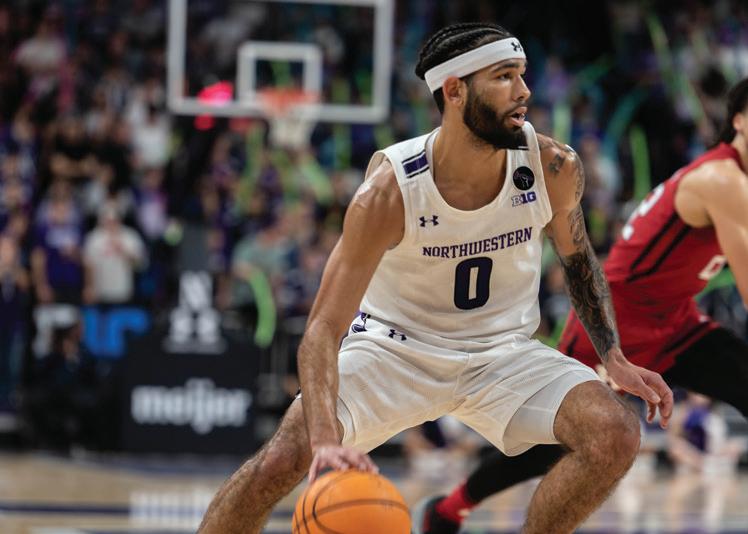
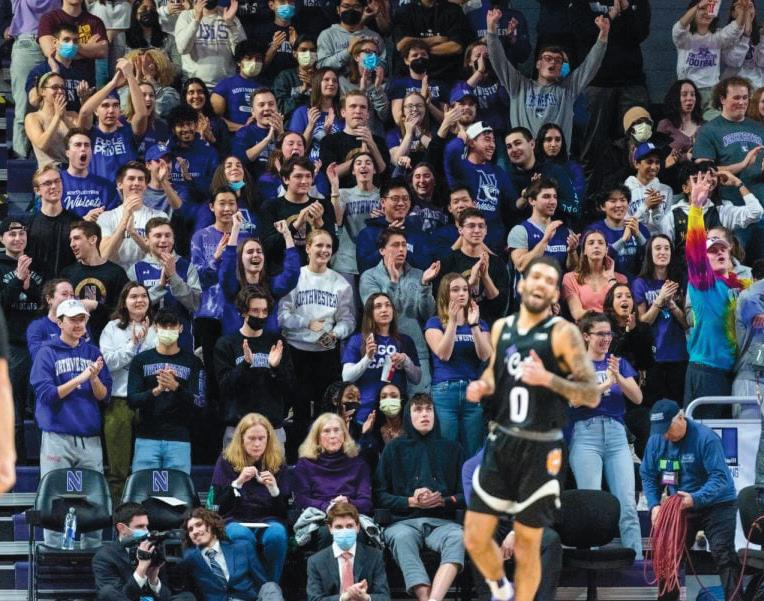
Wildside, the NU student section, sent a message Monday night announcing the student section will expand to include section 105, adding 200 seats for students. The athletic department will also run two additional game day shuttles, increasing the total to six. The first shuttles will begin running 30 minutes earlier.
Many students had difficulties using the shuttles Jan. 4. According to passengers, the four buses were extremely crowded and unable to pick up students after the first stops.
Wildside has long offered incentives to students who arrive early and come to games, distributing free food like Raising Cane’s and exclusive NU merchandise to early arrivers. Jones said these incentives are available to students even before the doors open for gametime.
“If they want (Raising) Cane’s, they want to be the first to get there, they can do that,” said Tyler Jones, the executive senior associate athletic director for revenue generation and strategic initiatives.
Bringing more students into the arena early lessens the crowds on the shuttles later in games and allows all students to enter and find their seats safely, without a long wait outside, according to Jones.
Against Rutgers on Wednesday, t-shirts were offered to the first 400
students and Raising Cane’s to the first 200.
At Welsh-Ryan’s original opening in 1952, section 105 was considered part of the student section and not sold to the general public. But over time, as student attendance waned, the section became available to the public.
In an interview with The Daily last spring, Associate Athletic Director for Strategic Initiatives and Communications Paul Kennedy said that with the sections behind the basket being so visible on television, the department decided to sell tickets in those sections, rather than let them sit empty.
“But the turnout, especially given the record in the team with Illinois, Indiana and Purdue, that gives us the ammunition to decide, we need to plan for (those) games to be sold out,” Kennedy said.
Last season saw multiple games with notably large student crowds — against Wisconsin, Purdue, Illinois and Indiana. Jones said the department’s internal data saw a high watermark of about 700 students, close to the capacity of the student section before the additional seats.
In response to massive demand for the Jan. 4 game against Illinois, the athletic department worked to relocate those who had bought seats in section 105 to other regions of the arena for the game on Wednesday against Rutgers. There was also overflow seating in the upper level as student demand surpassed the approximately 950-person capacity.
“If this is consistent, and we’re getting eight to nine hundred students per game, that helps us operationalize additional pivots,” Jones said. “That’s one pivot we want to commit to for Wednesday, and I’m hopeful that our
students appreciate it.”
With the men’s basketball team off to a 12-4 (3-2 Big Ten) start and playing like a potential postseason contender, student interest may be higher than it’s been in years. But the Feb. 12 contest against No. 3 Purdue is already sold out, and games against Indiana and Wisconsin in coming weeks have limited seating available, leaving few opportunities to move fans into other sections of the arena.
As of now, the expanded student section and increased shuttle service were only available Wednesday against Rutgers. Jones said if students continue to turn out in high numbers, they will look toward other systems to make sure as many students as possible can attend games.
For years, opposing fan bases like Illinois and Indiana have taken over Welsh-Ryan and made road games look like home games. But because
“When our students show up and get into the game the way they are, this is as good of an atmosphere as there is,” coach Chris Collins said postgame Jan. 4. “It’s a tough place to play.”
gabrielacarroll2023@u.northwestern.edu
To say this past week has been good for Northwestern basketball would be an understatement. The Wildcats defeated in-state rival Illinois by double digits in front of the home crowd on Wednesday — their first victory against the Fighting Illini since 2019. The wins kept coming on Sunday, with the Cats knocking off No.15 Indiana in Assembly Hall.
And while their upcoming opponent Rutgers was coming off a loss, Northwestern Athletics announced that the student section would be expanded to 1,400 seats, giving the squad enough fuel to power through another high stakes conference battle.
However, in a slugfest among defensive-led teams, NU’s second half scoring boost wasn’t groovy enough on Retro Night versus the Scarlet Knights, dropping their first contest of the new year, 65-62.
With the Big Ten’s top two scoring defenses battling it out at Welsh-Ryan Arena, it was known from the get-go that whichever squad could maintain some kind of success on the offense for the longest period of time would come out victorious. And for the majority of the game, Rutgers had the floor. The Scarlet Knights star guard Cam Spencer’s right wing three to begin the contest set the tone for the first half, as NU was unable to cut Rutgers’ lead to less than three for the first 20 minutes.
NU showed signs of flipping the table multiple times throughout the game. Following junior guard Ty Berry’s far corner three and redshirt senior guard
Northwestern announced that it has initiated an investigation into an alleged football hazing incident that followed the conclusion
Chase Audige’s putback that almost counted at the end of the first half, the Cats seemed to have the momentum heading into the half, only down by five points.
The same feeling came in the second half early, as NU cut Rutgers’ lead down to two points less than two minutes into the second block of 20-minutes following five straight points from Berry. As the clock closed into double zeros, the chances of a purple and white comeback became increasingly slim, with Rutgers holding a nine point lead nearing the seven-minute mark.
But that’s when the motor finally got going for the Cats, specifically for Audige and senior guard Boo Buie. The two would combine for the game’s next 10 points, capped off by an Audige right-handed layup, a crowd eruption and a Rutgers timeout. Out of the break, the two squads went blow for blow, with NU packing a little more powerful punch, leading to a four point lead
of the 2022 season.
ESPN reporter Adam Rittenberg broke the news on Twitter, citing Northwestern’s hiring of an independent lawyer, Maggie Hickey, to look into the alleged conduct. The University’s statement indicated the investigation will include interviews with players, coaches and staff.
Hickey co-leads the ArentFox Schiff firm’s
with less than a minute and a half left in the contest. However, a defensive miscommunication by the Cats resulted in a slimmer light for Spencer, pulling up, and knocking down a left wing three with 15 seconds remaining as Audige closed out less than a second too late. NU still had a chance to win the game with one possession, but Buie’s loss of ball control led to a jump ball in favor of Rutgers, silencing the Cats’ hopes.
1. Cats inability to get offense going in first half leads to ‘catch-up’ ball for majority of contest.
The Scarlet Knights were on fire at the start of the contest. Following Spencer’s three, Rutgers hit four straight shots, leading to a five-point lead five minutes to the matchup. If this was last Wednesday or Sunday, this wouldn’t be a problem for the Cats’ offense, who averaged around 78 points their last two contests. However, against the Big Ten’s top scoring defense, they struggled to string together multiple scoring possessions in the first half — leading to them playing ‘catch-up’ all throughout the second half.
The Cats’ offense was hitting on all cylinders in the first half against Indiana, a tumultuous task at one of college basketball’s toughest environments in Assembly Hall. By the 13 minute mark in the first half, they were fully in the driver’s seat with an 11-point lead.
Complex Litigation Group and Government Enforcement & White Collar Group, which focuses on internal investigations. In 2019, she oversaw the implementation of the multi-year consent decree working toward reforms for the Chicago Police Department.
The Wildcats ended their season late November, culminating the campaign with a 1-11 record under head coach Patrick
Although the one-point victory didn’t show, the Cats had the Hoosiers exactly where they wanted them for the majority of the contest due to that early lead.
The same could be said for their contest versus Illinois, using their six-point lead to start the game as a launchpad, a partial result of their seven-point lead heading into halftime. Although their 22-2 run in the second half was the nail in the coffin, an early game lead was clearly a momentum booster for an offense that scored 32 of their points off free throws.
Against Rutgers, though, the Scarlet Knights swung the first punch on offense, and NU was unable to recover — never securing a lead the entire contest. See the trend here?
Following Spencer’s dagger with 15 seconds left, the Cats and coach Chris Collins knew that this would be the last possession of the game. And with two timeouts to spare, there was no question that a timeout should be called to allow the Cats to set up a play, catch their breath and, most importantly, set themselves up for the best chance to score. However, as Buie crossed halfcourt and drove to the right hash, neither him nor Collins called a timeout. Less than two seconds later, both teams were scrambling for a loose ball, leading to NU’s chances slipping out of their hands. Knowing that other options were available, especially with multiple players with the hot hand, a timeout should’ve been called.
Fitzgerald. Just weeks after the season finished, NU dropped defensive coordinator Jim O’Neil after two seasons.
With recent speculation of David Braun being hired as the new defensive coordinator, the news of the alleged hazing incident shakes up the nature of the Cats’ program.
of the arena’s small size, the presence of a full and loud student section can level the playing field and create a true home-court advantage.